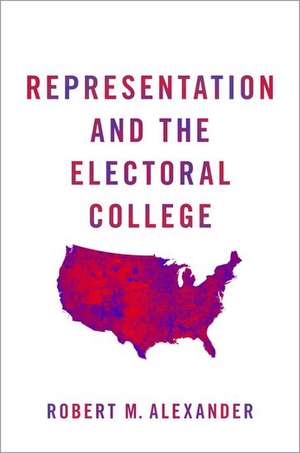Representation and the Electoral College
Autor Robert M. Alexanderen Limba Engleză Paperback – 30 mai 2019
Preț: 174.51 lei
Preț vechi: 212.42 lei
-18% Nou
Puncte Express: 262
Preț estimativ în valută:
33.40€ • 36.26$ • 28.05£
33.40€ • 36.26$ • 28.05£
Carte tipărită la comandă
Livrare economică 12-18 aprilie
Preluare comenzi: 021 569.72.76
Specificații
ISBN-13: 9780190939434
ISBN-10: 0190939435
Pagini: 232
Dimensiuni: 236 x 160 x 18 mm
Greutate: 0.45 kg
Editura: Oxford University Press
Colecția OUP USA
Locul publicării:New York, United States
ISBN-10: 0190939435
Pagini: 232
Dimensiuni: 236 x 160 x 18 mm
Greutate: 0.45 kg
Editura: Oxford University Press
Colecția OUP USA
Locul publicării:New York, United States
Recenzii
It is an extraordinary contribution — not just the theoretical parts about representation, but especially the empirical work about electors.
This book is an important analysis of the Electoral College, from the debates about it at the constitutional convention and during the early days of the republic to contemporary controversies that surround this unique construction. Alexander frames the book with the theoretical conundrum of representation, unpacking different kinds of representation and how these competing interpretations of representation have contributed to the ways in which voters, parties, candidates, and electors approach the Electoral College and understand its function within the American constitutional system.
Alexander provides a thorough, thoughtful, balanced analysis, carefully and engagingly shedding light on the multiple ways the Electoral College affects the nature of representation in the US. Drawing on historical primary source materials, original surveys of presidential electors, and previous scholarly work, Alexander explores the Founders' design of and original intent for the Electoral College and looks at how the institution has consistently evolved away from its origins. Federalism is a key focus. As one might expect, Alexander gives particular attention to those presidential contests in which the winner of the Electoral College vote did not win the popular vote, singling out the 2016 election. The author closes with insightful thoughts on possible reform options. An invaluable examination of the Electoral College at a critical juncture in American politics, this book could not be more timely.
Alexander's book is a tremendous achievement. Assessable and clearly written, this would be an excellent addition to any undergraduate course covering elections, American political development, or the presidency.-
Robert Alexander, master of all things related to the Electoral College, approaches this paradoxical institution with clarity and balance. This outstanding work is an excellent primer for those who wish to unpack the core elements of the Electoral College and come to grips with this antidemocratic aspect of America's struggling democracy.-
This well-written and accessible work, sure to be a hit with students, offers revealing interviews with electors who struggled over whether to support the unpopular presidential candidates endorsed by their home states-an issue that will certainly arise again.-
Both proponents and opponents of the Electoral College will find that Alexander offers a balanced view. This is an essential volume for students and scholars of the American presidency and an insightful read for the interested citizen
This book is an important analysis of the Electoral College, from the debates about it at the constitutional convention and during the early days of the republic to contemporary controversies that surround this unique construction. Alexander frames the book with the theoretical conundrum of representation, unpacking different kinds of representation and how these competing interpretations of representation have contributed to the ways in which voters, parties, candidates, and electors approach the Electoral College and understand its function within the American constitutional system.
Alexander provides a thorough, thoughtful, balanced analysis, carefully and engagingly shedding light on the multiple ways the Electoral College affects the nature of representation in the US. Drawing on historical primary source materials, original surveys of presidential electors, and previous scholarly work, Alexander explores the Founders' design of and original intent for the Electoral College and looks at how the institution has consistently evolved away from its origins. Federalism is a key focus. As one might expect, Alexander gives particular attention to those presidential contests in which the winner of the Electoral College vote did not win the popular vote, singling out the 2016 election. The author closes with insightful thoughts on possible reform options. An invaluable examination of the Electoral College at a critical juncture in American politics, this book could not be more timely.
Alexander's book is a tremendous achievement. Assessable and clearly written, this would be an excellent addition to any undergraduate course covering elections, American political development, or the presidency.-
Robert Alexander, master of all things related to the Electoral College, approaches this paradoxical institution with clarity and balance. This outstanding work is an excellent primer for those who wish to unpack the core elements of the Electoral College and come to grips with this antidemocratic aspect of America's struggling democracy.-
This well-written and accessible work, sure to be a hit with students, offers revealing interviews with electors who struggled over whether to support the unpopular presidential candidates endorsed by their home states-an issue that will certainly arise again.-
Both proponents and opponents of the Electoral College will find that Alexander offers a balanced view. This is an essential volume for students and scholars of the American presidency and an insightful read for the interested citizen
Notă biografică
Robert M. Alexander is a professor of political science at Ohio Northern University in Ada, Ohio. He is the author of four books and has served on the National Executive Committee for Pi Sigma Alpha and on the National Liaison Advisory Board for The Washington Center for Internships and Academic Seminars.
